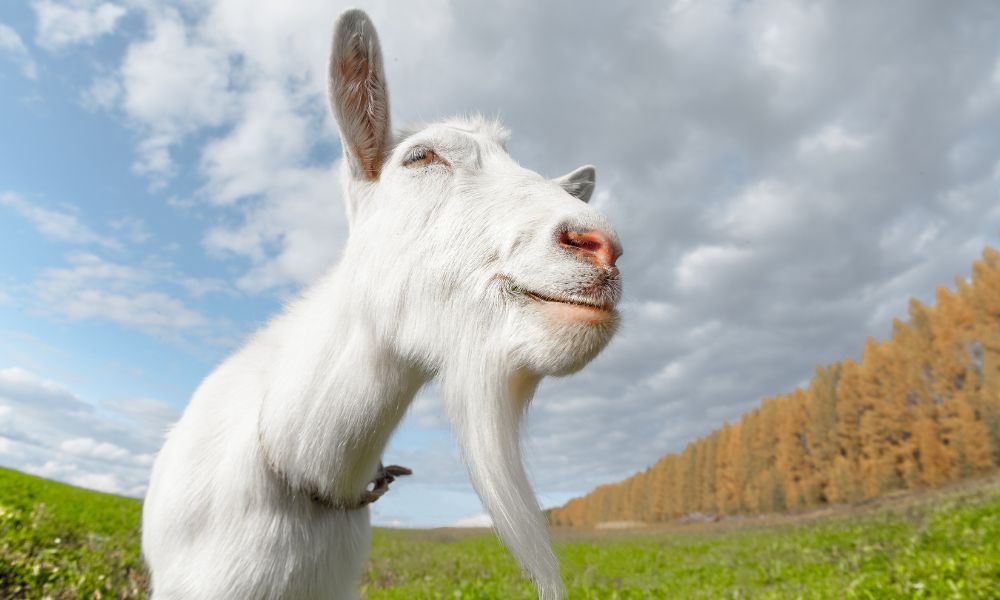Purring is one noise that goats will make when they are happy, then, but it’s no means guaranteed or the only one.
It’s also often something that only the kids do, and which they don’t necessarily retain into adulthood.
It’s an interesting question nevertheless, so let’s find out more.

What noise do goats make when happy?
There are several different noises that a goat might make when it is happy.
For an adult goat, purring probably is not the most common noise that a goat will make when it is happy.
That said, a purring goat is almost always a happy goat!
For the most part, though, goats make the same kinds of bleating, sheep-like noises that they usually make when they are happy.
Truthfully, it can be very difficult to actually tell the difference between the bleats of a happy goat and of just ordinary bleating.
To the goats, of course, the subtle differences are probably very clear, and they can tell when another goat is feeling happy or distressed based on the subtle differences in bleating.
As you get to know your goats, if you are carefully attentive to the noises they make, you will most likely eventually come to see the subtle differences between them.
What might be entirely opaque to someone who doesn’t know your goats will be much more transparent to you when you are around them all the time.
Bleating, then, of one kind or another, is the most common noise a happy goat will make.
Again, though, purring is definitely a sound to look out for.
If you do have a purring adult goat, then there can be little doubt that the goat is very happy, for one reason or another.
The fact that purring is not as common in adult goats just goes to show that if you have a goat that is doing it, they must be exceptionally happy!
Why, then, do goats do this?
Why do goats purr?
Goats purr for a few reasons, but it’s worth clearing up exactly what we mean by purring.
“True” purring, in zoology, is limited to felids and viverrids.
In other words, to cats and to other small mammals like genets.
This is a fairly strictly defined phenomenon characterized by tonal fluttering as a way of showing happiness or fear, or even as a defense mechanism.
The precise mechanism by which animals purr is still debated over.
In any case, the point is that goats do not “purr” in the strictest sense as this is reserved for only a few groups of animals.
A goat purring, then, is simply a way that it can show others it is feeling happy and comfortable.
As I mentioned, this is more commonly something that kids do, rather than mature goats.
Communication at a young age, whether with the mother of the kid or with the herd as a whole, is really important.
Purring is just one of many subtly different ways that goats can communicate through sound.
But ultimately the question of why specifically a goat should purr as opposed to making any other kinds of noise could simply remain a mystery.
As I said, the purring of a goat is very different from the purring of cats, and so any insight we might have into the specific reasons for that is not much use in asking why goats do it.
Purring is an easy noise to make in that it doesn’t take a lot of effort while communicating a simple but important thing: happiness.
That may be the best answer we can get!
Do adult goats purr?
Adult goats do purr but, as I’ve stressed, it does tend to be a lot more common in kids and juvenile goats.
Especially for recently born kids, purring is a relatively common behavior, though not universal.
In adults, though, it is not nearly as common to see.
Once goats reach a certain age and master their powerful vocal organs, they just tend to favor louder bleating and baaing noises rather than subtler purring.
This communicates over a wider area to the whole herd.
The main difference may be who the goat wants to communicate with.
As I said, young goats may only need to communicate with their mothers—older goats are more likely to want to with the whole herd.
Do goats always purr?
Goats definitely do not always purr.
Even if you get a goat who very often purrs as a kid, there’s no guarantee that they will continue purring into adulthood.
Even still, purring is still not a guaranteed behavior in kids, either.
Some do and it’s certainly not rare, but not all of them do.
If your goat doesn’t purr a lot, then don’t worry—this doesn’t mean it isn’t happy!
Your goats might purr, then, but they also might not.
It is certainly something that goats do when they are happy, but it’s not universal and it isn’t always something they do throughout their whole life.
Kids purr quite commonly but there’s a good chance they won’t continue doing it into adulthood.
Nonetheless, purring is definitely something that goats do when they are happy.
More in Sounds
- Do Goats Have Accents?
- Do Goats Purr?
- What Sound Does A Goat Make?
- Why Do Goats Scream?
- Why Do Goats Snort?
